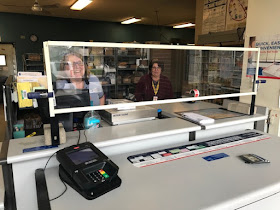by Anne Myles
 |
| A Laredo man living in Iowa is critically ill with COVID-19, and thanks to a co-worker who refused to give up, he has reconnected with his family. "I just feel like I made a Facebook post, answered a few messages and calls, but it was everyone's efforts that came together. It was the small things that added up to one big thing and that was getting to find Jose's family." Zach Medhaug and Jose Ayala, a Laredo native, are among the dozens of Tyson employees who tested positive for COVID-19 after an alleged outbreak at their Waterloo, Iowa facility. —KGNS.tv, May 4, 2020 |
there’s a wild, forgotten greenbelt
wrapping the creeks for miles.
The trees are close and full of quiet;
they open to still mirror pools.
Breath, footsteps, birdsong,
deer-dash, otter-splash.
In May, a sea of Virginia bluebells,
light purplish spume above deep leaves,
floods the woods to the edge of sight.
In Waterloo we watch the waves
of a century’s migrations break:
Black, Mexican, Bosnian,
Burmese, Congolese, Micronesian.
City of refugees and of no refuge,
city of industries here and gone
where the remnant of Rath Packing
still looms downtown, a darkened shell.
Scarred city river-riven—east side,
west side—half-sutured by ten bridges,
the Cedar silted, shallow, shining.
In Waterloo four green goddesses
from atop a long-demolished courthouse
cling to the brick roof of River Plaza:
Agriculture, Science, Justice, Knowledge.
They pose, holding vague implements,
blank faces still, almost compassionate.
Their skin burns hot in prairie sun.
*
In Waterloo, at the far edge of town,
sprawls the Tyson plant. Neighbors
of many languages work side by side
in the chill, the clang, the cutting, the flesh,
the coughing, the fevers, the fear.
The line for testing coils around the lot;
over a thousand positive, they’re living
the consequences of all that makes us.
At Tyson, maintenance worker Zach
made friends with self-contained José.
Zach got the virus but was barely sick;
José’s ventilated and unresponsive.
Zach calls every day to talk to him,
play music. He posted José’s picture
and found his family back in Laredo.
They’re fighting for him together now
in Waterloo, not giving up faint hope.
The plant closed, but has reopened.
Outside, the typical scraggly rally.
We line up by the drive at shift-change,
waving, holding signs: Protect Workers.
Estamos Con Ustedes. Capitalism
is the Pandemic. Through car windows
masked faces glance back quickly,
difficult to read. A few hands lift.
We hear faint screaming: pigs or gears?
Grass flares, the sky throbs blue,
everything’s sliced hard against it.
*
And now a long-ago lover phones
to ask if I’m okay. She’s seen Waterloo
on Maddow, CNN. I say I’m fine,
safe as can be. I tell her walking
the trails here makes me happy.
I tell her I see my privilege;
I didn’t even know about the plant
twelve minutes from my house.
I try to explain, it’s like I married
a city instead of a person, so far
from where I started, my own diaspora,
but after decades I still don’t know it.
I say, it’s more than what you hear.
I say, our bluebells are so beautiful.
Anne Myles retired from the University of Northern Iowa, where she was an Associate Professor of English. She is working on an MFA in poetry at the Vermont College of Fine Arts. Her poems have appeared in journals including North American Review, Friends Journal, Lavender Review, Gyroscope Review, Green Briar Review, and Whale Road Review.




























